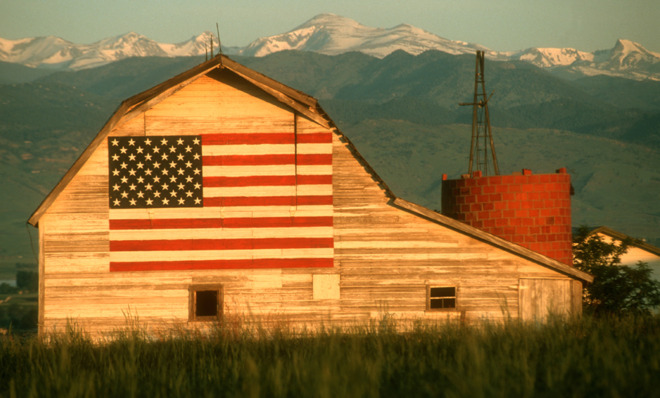Does America really need a higher purpose?
Some wish the United States would undertake the vast project of democratizing the globe. But it's enough to tend to your own garden.


A free daily email with the biggest news stories of the day – and the best features from TheWeek.com
You are now subscribed
Your newsletter sign-up was successful
The greatest American superstition of the last century or more is that America needs some greater purpose on the world stage — that it is a character in search of motivation. "What is America for?" the pundit asks. "If not my peculiar ideological fetish, then it must be for nothing."
David Brooks is one to worry in this vein. "Americans have lost faith in their own gospel," he recently wrote, noting a decline in sweeping visions of democratic capitalism that would make America the morning star of a new, better epoch in human history. "Without the faith, leaders grow small; they have no sacred purpose to align themselves with," Brooks wrote. "Young people get fired up by the thought of solar panels in Africa but seem much less engaged in the task of spreading political dignity and humane self-government."
The occasion for Brooks' lament is an essay by Mark Lilla, a veteran of the Committee on Social Thought and a Columbia professor. Lilla's essay bemoaned the onset of a glib libertarianism in our politics, where "the only freedom we are losing is the freedom to choose our freedoms." In a sense, Lilla's essay merely restated the conservative wisdom that we cannot know the direction of history, nor bend it to our will. Nondemocratic regimes are here to stay, so let's try to manage. Lilla essentially updated a supposed proverb of Martin Luther: It is better to be governed by a wise mullah, than by a foolish democratizer like Paul Bremer.
The Week
Escape your echo chamber. Get the facts behind the news, plus analysis from multiple perspectives.

Sign up for The Week's Free Newsletters
From our morning news briefing to a weekly Good News Newsletter, get the best of The Week delivered directly to your inbox.
From our morning news briefing to a weekly Good News Newsletter, get the best of The Week delivered directly to your inbox.
The truth of this is indisputable. Where would Brooks prefer to live, theocratic Tehran or "liberated" Mosul?
Brooks argued that this diminishment of America's democratic faith means "the country grows strangely indifferent to democratic heroes. Decades ago, everyone knew about Sakharov. But how many raised a fuss over the systematic persecution of democratic activists and Christians across the Middle East?"
But of course, it was precisely America's unleashing of modern and democratic forces in the Middle East that has intensified this persecution of Christians and liberal activists. When sovereignty is invested in "the people," the people usually respond with dramatic purges, ethnic cleansing, and legal apartheid, determining precisely who shall compose this new sovereign. Even a close study of our own history would show that trend: an "expansion of democracy" under Andrew Jackson led swiftly to the policy of Indian Removal.
When the estimable James Poulos asked, "What are women for?" in a column on sexual politics and the culture war, he was bruised for his presumption. In a resultant panel discussion on MSNBC, host Chris Hayes responded to the question this way: "It seems, I think, an odd question to ask about human beings, who are presumably for whatever their own ends are for."
A free daily email with the biggest news stories of the day – and the best features from TheWeek.com
Why not endow democratic governments with the same dignity of choosing their own ends?
Brooks' linking of American ebbs of American idealism with tides of American materialism is not only wrong but perverse, as if Americans were somehow worse off for buying cars in the 1920s than they were dying of gas attacks in Europe a decade earlier. And if noble causes were a cure-all for the materialism of the elite, then the Truman Committee would not have been booking companies for war-profiteering as the Greatest Generation made its name.
Times of peace are not absent of ennobling effects of sacrifice and duty. But the common sacrifices that fathers and mothers make for children, that entrepreneurs make for the future, that researchers make for the legacy of science, are somehow beneath our notice.
An analogy might suffice. Stern fathers often make the mistake of believing that their children will not defend the home or the values of the family if martial discipline is not instilled. But turning the homestead into a garrison then drives the children to go AWOL. Instead, all the father has to do is make his home a place of love and, yes, comfort. Having done that, his sons will defend it from any real threat with fire in their eyes.
Ideologues prefer the idea of an ideological nation, a crusader state. Crusader states inspire great battle poetry. But a democratic republic like America needs no purpose, no mission civilisatrice. It needs no poetry. America just needs to be our home — that will require sacrifice enough.
Michael Brendan Dougherty is senior correspondent at TheWeek.com. He is the founder and editor of The Slurve, a newsletter about baseball. His work has appeared in The New York Times Magazine, ESPN Magazine, Slate and The American Conservative.
-
 5 blacked out cartoons about the Epstein file redactions
5 blacked out cartoons about the Epstein file redactionsCartoons Artists take on hidden identities, a censored presidential seal, and more
-
 How Democrats are turning DOJ lemons into partisan lemonade
How Democrats are turning DOJ lemons into partisan lemonadeTODAY’S BIG QUESTION As the Trump administration continues to try — and fail — at indicting its political enemies, Democratic lawmakers have begun seizing the moment for themselves
-
 ICE’s new targets post-Minnesota retreat
ICE’s new targets post-Minnesota retreatIn the Spotlight Several cities are reportedly on ICE’s list for immigration crackdowns
